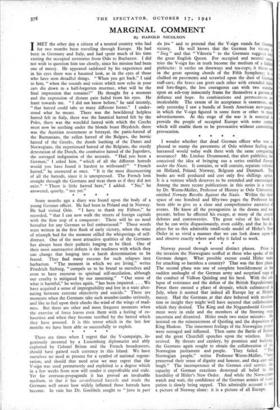MARGINAL COMMENT
By HAROLD NICOLSON
IMET the other day a citizen of a neutral country who had for two months been travelling through Europe. He had been in Germany and Italy, and had spent much of his time visiting the occupied territories from Oslo to Bucharest. I did not wish to question him too closely, since his mission had been one of mercy. He appeared saddened by his experience and in his eyes there was a haunted look, as in the .eyes of those who have seen dreadful things. " When you get back," I said to him, " when the sounds and voices which now echo in your ears die down to a half-forgotten murmur, what will be the final impression that remains?" He thought for a moment and the expression of distant pain faded from his eyes. He leant towards me. " I did not know before," he said intently, " that hatred could take so many different forms." I under- stood what he meant. There was the bewildered helpless hatred felt in Italy, there was the fanatical hatred felt by the Poles, there was the watchful hatred with which the Czechs must now be seething under the blonde beast Heydrich, there was the Austrian resentment at betrayal, the panic-hatred of the Rumanians, the sullen hatred of the Bulgars, the heroic hatred of the Greeks, the dumb loathing of the Danes and Norwegians, the experienced hatred of the Belgians, the sturdy detestation of the Dutch, the combative hatred of the Jugoslays, the outraged indignation of the neutrals. " Had, you been a German," I asked him, " which of all the different hatreds would you have found it hardest to withstand?" " French hatred," he answered at once. " It is the most disconcerting of all the hatreds, since it is unexpressed. The French look straight through the Germans and treat them as if they did not exist." " There is little hatred here," I added. " No," he answered, quietly, " not yet." * * * *


























 Previous page
Previous page